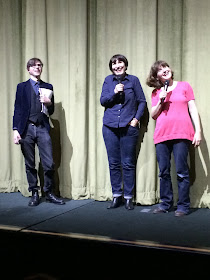Just before Christmas there was a screening of the film about The Dollymixture, Take Three Girls plus the Arena documentary on X-Ray Spex, at The Regent Street Cinema.
I hadn't seen the Dollymixture film and Rachel invited me along. It's such a good film; it brought a lot back about how you can accidentally end up in a band, and then become completely serious about what you're doing. Then how much it hurts when you realise people are just looking at you and thinking about ways to exploit you.
They wrote really good songs together, and it was intriguing to hear that they had written songs for Lena Zavaroni. I loved the travel stories- the old banger they drove round in, their eventual van, their loyal roadie. It's all told by the three of them in turn; what's amazing is the amount of archive footage there is of them rehearsing and so on. Spots, stripes, guitars, cigarettes, mixing desks and the studio couch, that rare breed of furniture covered in smelly, sticky rough canvas in a putrid shade of griege.
Afterwards there was a Q & A and I was touched by the namecheck (and one for June Miles Kingston too), as being rare friendly female artists. I remember being so pleased whenever The Chefs got to gig with them, because they were girls and I was one as well. When we got offered a residency at the Moonlight Club in West Hampstead I asked for them to be our support band because I liked their songs and I liked them as people, too. Sometimes, we were their support band. No egos at play.
I think they were greatly underestimated not just musically but also because of their approach; they really knew what they wanted, but the infrastructure simply wasn't in place to get them there. The music industry was too old-fashioned to cope with such complex and talented women.
Both The Dollymixture and The Chefs did covers of the Velvet Underground's Femme Fatale, both very differently.
Which reminds me: have you bought this fundraising track yet? It's not too late!
Afterwards the Arena documentary was shown, introduced by (I think) its producer who bigged up Alan Yentob as a person who elevated popular culture by drawing it to Arena's attention.
The documentary made me feel sad, partly because of the loss of Poly and her smile and her independence, but also because it doesn't portray the truth of what Falcon Stuart, her then manager/boyfriend, was doing or was about to do. I loved the scenes of her running through her song alongside the passive-aggressive communication between the sax player and the guitarist: one of those wars between 'the dots' and 'the feel' that are familiar to so many musicians.
It was an intensely moving but satisfying evening partly because of the sense of a whole bunch of us living parallel lives with such similar experiences; there were a lot of familiar faces there too, still alive and still kicking ass.


No comments:
Post a Comment